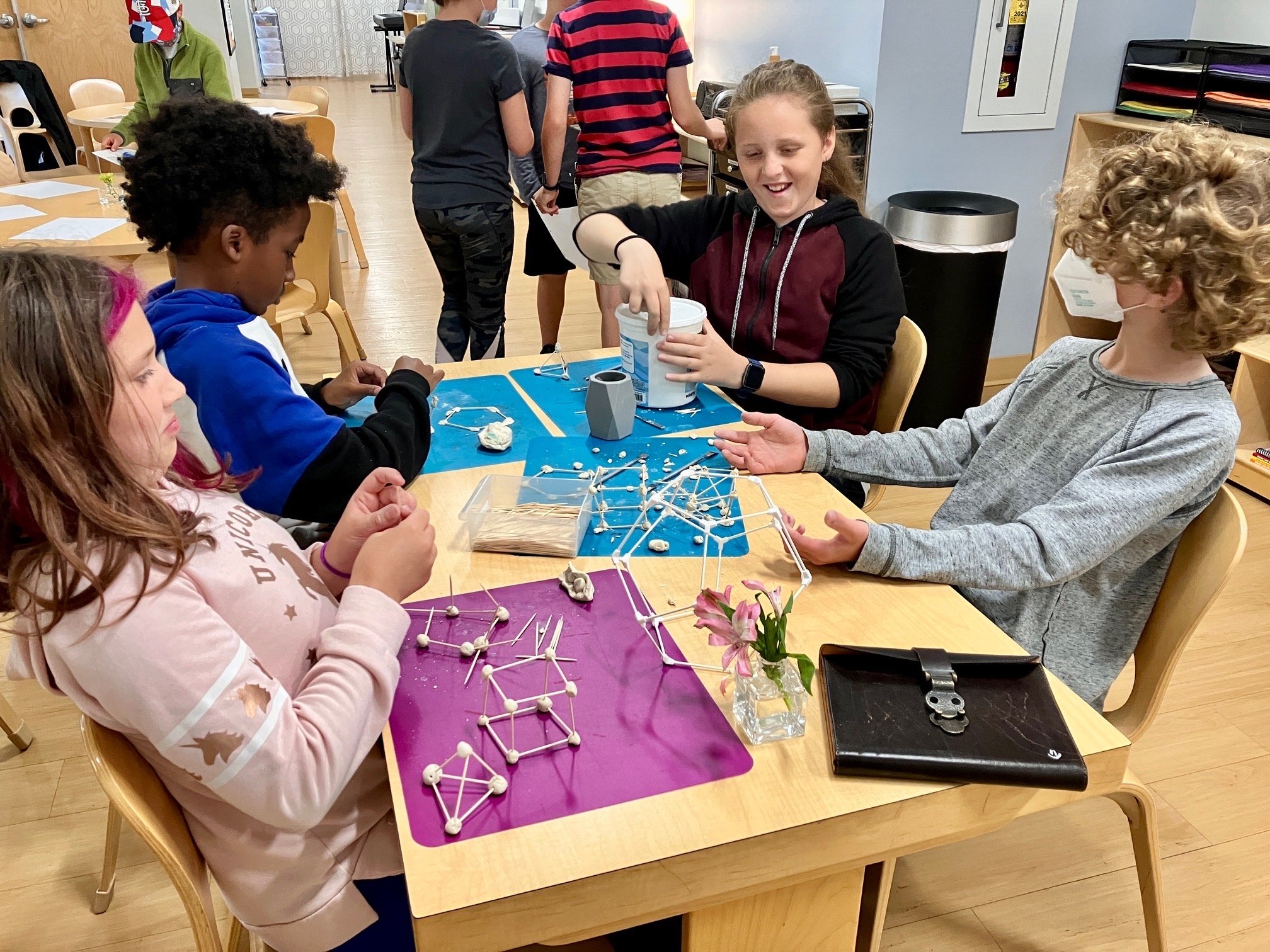5 Montessori Myths
 At Villa di Maria, we’re not hiding the fact that we love Montessori and all the good things it offers children. We get to see the method in action every day and the joy it brings each student. Sometimes families come to us with misconceptions about the Montessori approach. They’ve heard things that don’t sit well with them or prompt skepticism. We love when people bring their questions to us because we know Montessori is up to the task and we relish an opportunity to discuss our favorite topic, Montessori education!
At Villa di Maria, we’re not hiding the fact that we love Montessori and all the good things it offers children. We get to see the method in action every day and the joy it brings each student. Sometimes families come to us with misconceptions about the Montessori approach. They’ve heard things that don’t sit well with them or prompt skepticism. We love when people bring their questions to us because we know Montessori is up to the task and we relish an opportunity to discuss our favorite topic, Montessori education! In this post we’ll address some of the myths people encounter about Montessori schools and students. We hope that it leads you to look again and consider all that this unique approach has to offer. Everyone is welcome, whether you know alot about Montessori or nothing at all!
In this post we’ll address some of the myths people encounter about Montessori schools and students. We hope that it leads you to look again and consider all that this unique approach has to offer. Everyone is welcome, whether you know alot about Montessori or nothing at all!
1. Montessori is only for the wealthy.
Though the majority of Montessori schools in the U.S. are privately funded, the roots of Montessori present a different perspective. Dr. Maria Montessori started her first school in an Italian slum caring for children whose parents worked all day outside the home. Today more and more Montessorians seek to make Montessori education more accessible to a wider group of children in the world and the U.S. Today, there are more than 500 publicly funded Montessori schools in the United States. The National Center for Montessori in the Public Sector (see their website here: https://www.public-montessori.org/montessori/) strives to bring Montessori education to more publicly funded schools in the U.S. Villa di Maria desires to offer a Montessori education to as many children as possible regardless of income or economic status. We believe the gift of Montessori should be accessible to families that are deeply committed to providing this educational experience for their child despite financial barriers. Through our generous donors, VdM offers tuition discounts and financial aid to many families in our community.
2. Montessori fails to adequately prepare children for high school and college.
Many parents share the concern, “Will my child be ready for school after VdM, if they transition to a non-Montessori school?” A true Montessori education prepares the child for life, including life outside the context of Montessori. Guides ensure students have all the lessons and skills the state requires for each grade level. Students at VdM start taking yearly standardized tests at grade 4 to prepare them for test taking in “the real world”. Guides practice test taking skills with these students so they will be adequately prepared. As for how Montessori students compare to children in a traditional education setting, several studies have been done that show Montessori students outperform non-Montessori students on standardized tests on some measures. You can check out the latest study here:https://www.montessoripublic.org/2021/02/montessori-outperforms-on-standardized-tests/ What about homework?Though Montessori doesn't usually assign homework, through the development of self-management skills in the classroom (choosing their own work, etc.), students have no trouble managing homework in high school or college. Montessori students are used to arriving at their own understanding through manipulation of concrete materials and thus are better prepared to learn in any context throughout their lives. VdM has heard from many of our alums that they found it quite easy to transition to a traditional school experience, though they miss the Montessori setting! In the months to come, we’ll hear from some of these former students on the blog to learn how Montessori prepared them for life after VdM.
What about homework?Though Montessori doesn't usually assign homework, through the development of self-management skills in the classroom (choosing their own work, etc.), students have no trouble managing homework in high school or college. Montessori students are used to arriving at their own understanding through manipulation of concrete materials and thus are better prepared to learn in any context throughout their lives. VdM has heard from many of our alums that they found it quite easy to transition to a traditional school experience, though they miss the Montessori setting! In the months to come, we’ll hear from some of these former students on the blog to learn how Montessori prepared them for life after VdM.
3. Montessori allows unrestricted freedom to the child.
Many folks know that Montessori allows for freedom of movement and work choices in the classroom. They fear that means children have complete freedom to do whatever they want without any accountability. It is true that in a Montessori classroom children choose their activity, where they work, and with whom they work, but this does not result in disorder or unbalanced work choices. Montessori offers freedom to children based on their ability to responsibly manage it. Some children may need more support and scaffolding in the classroom than others. For some children choosing work from the whole classroom can be overwhelming. For those children, the guide might offer two choices, “Would you like to do a bead chain or metal inset next?” Other children may work best when situated near an adult. The guide might position herself or the assistant nearby for quick help.
 In Elementary, guides utilize tools such as the work journal and the weekly conference to hold students accountable for their use of work time. Elementary students record their work choices and the duration spent on each activity throughout the work periods (morning and afternoon) in their work journals. The guide and student then meet each week to review the work in their journals and reflect together on the use of the work periods to cover all subject areas of the classroom. They also set goals for the following week and make plans for improvement and growth.
In Elementary, guides utilize tools such as the work journal and the weekly conference to hold students accountable for their use of work time. Elementary students record their work choices and the duration spent on each activity throughout the work periods (morning and afternoon) in their work journals. The guide and student then meet each week to review the work in their journals and reflect together on the use of the work periods to cover all subject areas of the classroom. They also set goals for the following week and make plans for improvement and growth.
4. Montessori is a type of prep-school concerned primarily with getting students into elite higher-education programs.
Montessori cares about developing the whole child–the social, academic, emotional, and physical aspects of the child. The Montessori approach allows students to progress at their own pace and many exceed the curriculum and standards set by the state for their grade level. As shown above, Montessori students tend to perform well on standardized tests when compared to their peers. The high performance of many Montessori students might lead some to think that is the sole aim of Montessori philosophy–simply to pump out academically “smart” kids. While Montessorians do care about developing and sharpening students’ intellectual capabilities and we know they will go on to do great things, we equally value keeping their curiosities alive and giving them opportunities to develop the social and emotional skills they will need to thrive in their lives.
5. Montessori is only for “gifted” students or for children with learning differences.
Montessori can benefit any child, whether categorized by society as “gifted”, “normal” or with learning differences. Montessori applied her child-centered approach in schools with intellectually challenged children to great success. She also saw benefit when applying her philosophy in schools with children without so-called “learning disabilities”. Many families seek out a Montessori program because the traditional school model is not working for their child–the lack of movement, adult-led and frequent transitions between subject areas/tasks, less opportunity to advance at their child’s unique learning pace. The many benefits of a Montessori classroom, including freedom of movement, hands-on learning, and ample access to the outdoors, can be helpful to children who have specific learning differences or are classified as “gifted”. While VdM does not offer an explicit Special Education program during the school day, there are opportunities to connect to Special School District for support outside the classroom. The strength of Montessori is that it allows each child to move at their own unique pace of learning and to become life-long learners with the skills necessary to thrive in a complex world. We hope addressing these commonly heard Montessori myths prompts you to further explore your own questions about how best to achieve a holistic, child-centered approach to education. We believe Montessori best fits the developmental needs of the child at each age and stage of development and we’d love to talk to you more about how! Reach out to our staff to talk more or peruse our rich resource of blog posts. Here’s a good place to start:http://www.montessori-blog.org/2020/09/21/the-expectation-effect-montessori-and-batman/http://www.montessori-blog.org/2018/12/05/on-choice-part-3-choice-community-and-the-montessori-classroom/
We hope addressing these commonly heard Montessori myths prompts you to further explore your own questions about how best to achieve a holistic, child-centered approach to education. We believe Montessori best fits the developmental needs of the child at each age and stage of development and we’d love to talk to you more about how! Reach out to our staff to talk more or peruse our rich resource of blog posts. Here’s a good place to start:http://www.montessori-blog.org/2020/09/21/the-expectation-effect-montessori-and-batman/http://www.montessori-blog.org/2018/12/05/on-choice-part-3-choice-community-and-the-montessori-classroom/

